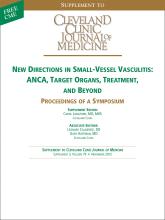ABSTRACT
Granulomatosis with polyangiitis (GPA) is a type of vasculitis that affects the respiratory tract and kidneys. Without treatment, half of patients die within 6 months. Standard therapy (a daily combination of cyclophosphamide and glucocorticoids) can induce remission, but the duration is short and treatment is plagued by serious morbidity. Advances in understanding the potential target of cyclophosphamide— B cells, that indirectly give rise to antineutrophil cytoplasmic antibodies (ANCA)—led to a new B-cell–targeted strategy. We administered rituximab, an anti–B-cell agent, to patients with severe GPA and microscopic polyangiitis. Overall, rituximab matched the efficacy of cyclophosphamide in inducing remission and was superior in patients with relapsing disease. The timing of re-treatment can be individualized based on patients’ B-cell counts and ANCA levels in patients with chronically relapsing GPA.
- © 2012 The Cleveland Clinic Foundation. All Rights Reserved.






